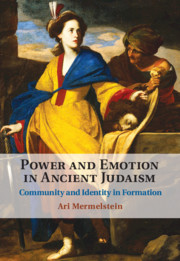Book contents
- Power and Emotion in Ancient Judaism
- Power and Emotion in Ancient Judaism
- Copyright page
- Dedication
- Contents
- Acknowledgments
- Abbreviations
- Introduction Power and Emotion in Ancient Judaism
- Part I Jewish Emotional Resistance to Gentile Power-Over in the Greco-Roman Diaspora
- Part II Jewish Emotion Discourse in Response to Divine Power-Over
- Part III The Dead Sea Sect As Emotional Community
- Conclusion
- Bibliography
- Primary Source Index
- Modern Author Index
- Subject Index
Conclusion
Published online by Cambridge University Press: 04 June 2021
- Power and Emotion in Ancient Judaism
- Power and Emotion in Ancient Judaism
- Copyright page
- Dedication
- Contents
- Acknowledgments
- Abbreviations
- Introduction Power and Emotion in Ancient Judaism
- Part I Jewish Emotional Resistance to Gentile Power-Over in the Greco-Roman Diaspora
- Part II Jewish Emotion Discourse in Response to Divine Power-Over
- Part III The Dead Sea Sect As Emotional Community
- Conclusion
- Bibliography
- Primary Source Index
- Modern Author Index
- Subject Index
Summary
This book has argued that the experience of powerlessness among ancient Jews who lived as a minority group under foreign rule, subject to both cultural and physical domination, was expressed by various Jewish writers through emotion discourse. Writers representing the Dead Sea Sect likewise articulated, or at least constructed, feelings of powerlessness fueled by sectarian strife. The emotion discourses prescribed by the texts analyzed in this book seek to neutralize the power-over of others and restore the power-to of their communities; these discourses help one feel that Jewish beliefs and practices promote an outlook on social life that is conducive to power. The expected emotions define one as a committed Jew and serve to distinguish one from the outside world, a fact that has led me to refer to this range of emotion discourse as “feeling Jewish.” In this concluding chapter, I synthesize my analyses and consider the implications of Jewish feelings for an understanding of the nexus between power and emotion.
- Type
- Chapter
- Information
- Power and Emotion in Ancient JudaismCommunity and Identity in Formation, pp. 258 - 267Publisher: Cambridge University PressPrint publication year: 2021

